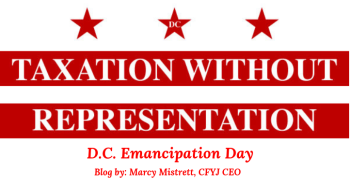D.C. Emancipation Day

Every April 16, Washingtonians celebrate the anniversary of the day that more than 3,000 of its residents were emancipated from slavery. One-hundred and fifty-seven years after slavery officially ended in the District, the legacy of slavery remains with us in the nation’s capital. Through the halls of Congress and the White House, both erected through the labor of enslaved people to the current lack of representation in the U.S. Congress, we are reminded of the many ways that the residents of the District of Columbia are still fighting for freedom and equality.
Every April 16, Washingtonians celebrate the anniversary of the day that more than 3,000 of its residents were emancipated from slavery. One-hundred and fifty-seven years after slavery officially ended in the District, the legacy of slavery remains with us in the nation’s capital. Through the halls of Congress and the White House, both erected through the labor of enslaved people to the current lack of representation in the U.S. Congress, we are reminded of the many ways that the residents of the District of Columbia are still fighting for freedom and equality.
In no place is this clearer than in the District’s justice system. Two-decades ago, under great financial debt and faced with a dilapidated and violent prison system (The Lorton Reformatory), the U.S. Congress passed the National Capital Revitalization and Self-Government Improvement Act (the “Revitalization Act or 1997”). The Act turned the incarceration of D.C. residents convicted of felonies over to the Federal Bureau of Prisons (FBOP). The Revitalization Act also turned the parole and supervision of D.C. residents (pre and post trial) over to the federal government. District Court judges that preside over these cases are appointed by the President and approved by Congress. Assistant U.S. Attorneys charge and prosecute our residents. Furthermore, all the costs to prosecute, incarcerate, and supervise D.C. residents are paid for by the federal government. This includes youth who are charged under title XVI—those under age 18 who are charged as adults by the U.S. Attorney’s Office. Below is a quick look at who these laws impact:
- According to the U.S. Federal Bureau of Prisons, there are approximately 5,000 D.C. residents currently serving time in the Federal Bureau of Prisons;
- 97% are African American;
- They represent 85% of all DC prisoners (this doesn't include the D.C. jail population);
- 18,000 residents are incarcerated or under court supervision;
- Approximately 95-100 youth under the age of 18 are charged as adults annually;
- Because they plea to felonies, they are often categorized in need of maximum security facilities, and often face 23 hours a day lock down;
- While the Bureau of Prisons is supposed to place D.C. residents within 500 miles of the District, analysis suggests only half of those incarcerated fall within these guidelines;
- D.C. is one of only 4 jurisdictions in the country who allow youth to be charged as adults by prosecutors and no judicial review, with no ability to waive the youth back to juvenile court (they are joined by FL, LA & MI).
While progress has been made in recent years to mitigate the harm of our federalized justice system, including D.C. taking back operation of the Correctional Treatment Facility; the strengthening of the Youth Rehabilitation Act (2018), passage of the Comprehensive Youth Justice Amendment Act (2016) that includes the Incarceration Reduction Amendment Act and the requirement for youth charged as adults to be removed from the adult jail and placed under physical custody to the Department of Youth Rehabilitation Services (DYRS). Currently, there are 98 D.C. residents who went to prison as children who are now eligible for resentencing. In order for D.C. to really celebrate the emancipation of its people, there are some important policy changes that still need to be made in our justice system:
- D.C. needs to take back our parole board from federal control;
- D.C. needs to use its statute for judicial waiver for 16 & 17 year olds instead of directly filing them in the adult system;
- D.C. needs a reverse waiver provision that protects youth against being overcharged as adults;
- DYRS needs to contract with FBOP to retain custody of all youth under age 18 remain at New Beginnings;
- The D.C. Superior Court needs to ensure youth probation data is public and transparent;
- D.C. needs a plan to invest in and reconnect our emerging adult population that is impacted by the Youth Rehabilitation Act;
- D.C. needs to invest heavily in the success of our residents who are returning home—many left as children or young adults and need to develop the skills and competencies necessary for successful adulthood.
150 years ago, D.C. freed its enslaved residents; 22 years ago, during a period of frenetic mass incarceration, she turned tens of thousands of her residents to the federal government; 97% of those D.C. incarcerates are African American—a number that hasn’t changed despite the decline of African Americans to less than 50% of the city’s population. It’s time to really celebration Emancipation Day and free our incarcerated residents in the District.

